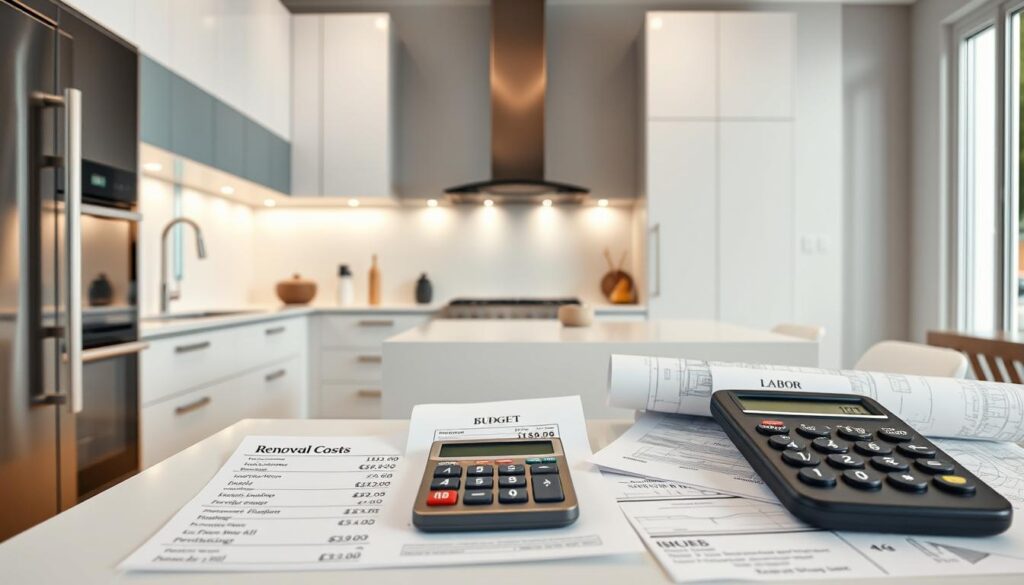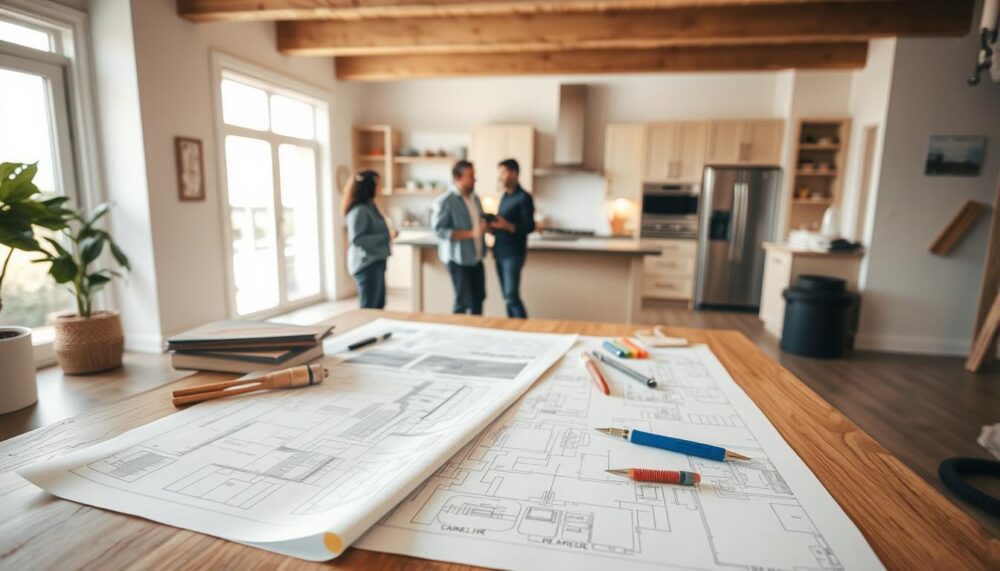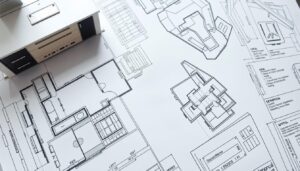Planning a kitchen renovation can be an exciting yet daunting task, especially when it comes to understanding the legal requirements. Whether you’re considering a minor refresh or a full-scale transformation, it’s crucial to grasp the rules surrounding permits to avoid potential fines or project delays.
At AVO Renovations, we understand the complexities of kitchen projects and are here to guide you through the process. While some cosmetic changes, such as painting or replacing flooring, may not require a permit, structural alterations or significant layout changes often do. For instance, moving plumbing fixtures or altering electrical setups typically necessitate formal approval1.
It’s important to differentiate between projects that require permits and those that don’t. Structural changes, such as removing walls or modifying load-bearing structures, usually demand a permit2. Conversely, cosmetic updates like new cabinets or countertops often don’t. Understanding these distinctions early on ensures your project remains compliant and avoids costly repercussions.
AVO Renovations is committed to helping homeowners navigate these regulations, ensuring your kitchen renovation is both safe and lawful. By understanding the requirements upfront, you can enjoy a seamless and stress-free renovation experience.
Understanding UK Building Regulations for Kitchen Renovations
Understanding the legal aspects of a kitchen renovation can be complex, but it’s essential to ensure your project is compliant with UK building regulations. These regulations are in place to ensure safety, energy efficiency, and accessibility in your home. Whether you’re planning a minor update or a major overhaul, knowing the rules can save time and prevent costly issues3.
Key Building Regulation Requirements
Building regulations in the UK cover various aspects of home improvements, particularly in kitchen renovations. Controlled services and fittings, such as plumbing, electrical work, and gas installations, often require approval. For instance, relocating a boiler or installing a new gas appliance must comply with Approved Document J4.
Material alterations, such as removing a wall or changing the layout, can also trigger the need for compliance. Even small changes, like modifying drainage connections for a sink, may require approval under Approved Document H4.
| Regulation | Requirement | Compliance Standard |
|---|---|---|
| Part G | Sanitation, Hot Water Safety | Ensure safe water temperatures and storage |
| Part H | Drainage and Waste Disposal | Proper drainage connections and disposal systems |
| Part J | Combustion Appliances | Safe installation and ventilation for gas appliances |
| Part L | Energy Efficiency | Meet thermal performance standards for walls and windows |
| Part P | Electrical Safety | Safe installation of new circuits and electrical work |
Importance of Compliance in Your Renovation
Compliance with building regulations is crucial to avoid legal issues and ensure your home remains safe. Non-compliance can lead to enforcement notices, fines, or even void insurance3. AVO Renovations, as a trusted expert, can guide you through these requirements, ensuring your project meets all necessary standards while staying on time and within budget.
do i need a permit to renovate my kitchen
When planning a kitchen renovation, understanding whether you need a permit is crucial to avoid legal issues and ensure safety. Generally, cosmetic changes like painting or replacing countertops don’t require a permit, but structural changes or system alterations do5.
For instance, moving a sink or installing new appliances often requires approval from local authorities. A contractor’s involvement may also trigger the need for a permit, especially if they’re handling electrical or plumbing work. AVO Renovations can help clarify these requirements and ensure compliance with UK building regulations6.
It’s important to differentiate between projects that require permits and those that don’t. Structural changes, such as removing walls or modifying load-bearing structures, usually demand a permit5. Conversely, cosmetic updates like new cabinets or countertops often don’t. Understanding these distinctions early on ensures your project remains compliant and avoids costly repercussions.
AVO Renovations is committed to helping homeowners navigate these regulations, ensuring your kitchen renovation is both safe and lawful. By understanding the requirements upfront, you can enjoy a seamless and stress-free renovation experience. For more detailed guidance, visit our resource page on kitchen renovation permits7.
Navigating the Permit Application Process
Embarking on a kitchen remodel involves more than just design choices; it requires a clear understanding of the permit application process. Whether you’re altering doorways, adding windows, or making structural changes, securing the right permits is essential to avoid legal issues and ensure safety.
Planning and Documentation
A successful permit application begins with thorough planning. Start by gathering all necessary documents, including architectural plans and technical specifications. This ensures your project meets local building regulations. Professional guidance can be invaluable here, helping you navigate the complexities of the process8.
Local Authority Contacts and Timelines
Contacting your local authority early is crucial. Permit approval timelines vary, typically ranging from 2-4 weeks for building permits and 1-2 weeks for electrical or plumbing permits8. Delays can be minimized with careful preparation and professional advice.
| Permit Type | Documentation Needed | Submission Tips |
|---|---|---|
| Building Permit | Architectural plans, structural drawings | Ensure all measurements are precise |
| Electrical Permit | Wiring diagrams, fixture specifications | Highlight all electrical changes clearly |
| Plumbing Permit | Pipe layouts, fixture details | Note all water and gas line changes |
AVO Renovations can assist with preparing your documents and understanding the scope of your project. They ensure compliance with UK building regulations, making the process smoother and less stressful. For more detailed guidance, visit our resource page on navigating local regulations9.
Role of Professional Advice and AVO Renovations
Professional advice is invaluable when navigating the complexities of kitchen renovations, especially when structural changes are involved. AVO Renovations emerges as a trusted partner, offering expert guidance to ensure compliance with UK building regulations and a seamless renovation process.
When to Consult a Principal Designer
A principal designer is essential for major projects involving structural alterations or layout changes. Their expertise ensures safety and compliance, particularly when dealing with complex aspects like load-bearing walls or extensive electrical work.
How AVO Renovations Can Help
AVO Renovations provides tailored support, from initial planning to permit acquisition. Their team ensures your project adheres to all legal requirements, offering practical solutions that keep your renovation on track and within budget.
| Service | Description |
|---|---|
| Planning and Design | Comprehensive plans ensuring compliance with building regulations. |
| Permit Handling | Expert guidance through the permit application process. |
| Budgeting Support | Helping you allocate resources effectively to meet your project needs. |
“Professional guidance can transform a complex permit process into a manageable task, ensuring your renovation is both lawful and stress-free.”10
AVO Renovations reassures homeowners that professional guidance simplifies the permit process, avoiding costly repercussions and ensuring safety. They define scenarios where permits are non-negotiable, such as major structural changes, and outline the risks of non-compliance.
Structural Changes and Safety Considerations
When undertaking a kitchen remodel, structural changes and safety considerations are paramount to ensure compliance with UK building codes. Any alterations to load-bearing walls or electrical and plumbing systems require careful assessment to prevent potential hazards and legal repercussions.
Assessing Load-Bearing Wall Alterations
Load-bearing walls play a crucial role in maintaining the structural integrity of your home. Altering these walls without proper approval can lead to serious safety issues. For instance, removing a load-bearing wall may necessitate the installation of a new lintel to support the structure11. Additionally, any changes must comply with Approved Document A of the UK Building Regulations, which covers structural safety.
Electrical and Plumbing Safety Checks
Electrical and plumbing modifications during a remodel must adhere to strict safety standards. Relocating electrical outlets or altering plumbing connections requires permits and inspections to ensure compliance with building codes. For example, moving a sink or installing a new gas appliance must meet the requirements outlined in Approved Document P and G, respectively12. These checks ensure the safety of your home and its occupants.
Non-compliance with these regulations can result in fines and legal action, as highlighted by data showing that unpermitted work can lead to enforcement notices and void insurance13. Therefore, it’s essential to work with professionals who understand local building requirements to ensure your remodel is both safe and lawful.
Integrating Budget, Costs and Fitting Considerations
Planning a kitchen renovation involves more than just design choices; it also requires careful budget planning to ensure the project stays on track. Understanding the costs involved and how they fit into the overall remodel permit process is essential for a successful renovation.
Understanding Fitting and Appliance Costs
Kitchen fittings and appliances are significant contributors to the overall cost. Cabinets alone can account for approximately 30% of the total budget, while high-end appliances and custom designs can drive up expenses further14. Homeowners should also consider the cost of installation, which can vary depending on the complexity of the job.
Budgeting for Extra Expenses
Beyond the initial fittings and appliances, it’s crucial to account for additional expenses. Skip hire, plastering, and tiling are common costs that can add up quickly. According to recent data, hidden expenses such as structural repairs can increase remodeling costs by an additional 10% to 20%15. Setting aside a contingency fund of 10-15% of the total budget is recommended to cover unexpected costs.
Moreover, labor costs can account for 20-35% of the total budget, emphasizing the importance of selecting experienced contractors15. Regional price variations can also lead to differences in remodeling costs, with high-cost living areas potentially seeing a 30% increase in overall project expenses15.
AVO Renovations advises homeowners to account for these extra expenses and ensure that safety is not compromised by budget cuts. A clear cost breakdown is essential to avoid delays in the remodel permit process and ensure the project remains within budget.

Preparing Your Kitchen Project: Step-by-Step How-To Guide
Embarking on a kitchen renovation is an exciting journey, but it requires careful planning to ensure everything goes smoothly. AVO Renovations is here to guide you through the process with expert advice and support.
Initial Planning and Design
The first step is to create a detailed plan. This includes sketching out your space and consulting with professionals to ensure compliance with building codes16. AVO Renovations recommends allocating 10-15% of your budget for unexpected expenses, as hidden costs can arise during renovations17.
When designing your kitchen, consider the “kitchen triangle” rule for efficiency. This involves placing your stove, sink, and fridge to form a triangle, optimizing workflow18. Energy-efficient appliances, such as those with the Energy Star label, can save up to 30% on energy bills17.
Executing the Renovation Phase
Once your plan is ready, it’s time to start the renovation. Begin by obtaining all necessary permits for electrical work, gas installations, and plumbing. AVO Renovations can assist with this process to ensure compliance with local regulations18.
Proper ventilation is crucial. Install a high-quality range hood to maintain air quality, especially if you cook frequently17. Ensure all electrical and plumbing modifications meet building codes to avoid legal issues16.
Finally, conduct a thorough inspection to ensure everything meets code requirements. AVO Renovations can help you navigate this final step, ensuring your kitchen is both safe and lawful16.
| Phase | Key Actions | Considerations |
|---|---|---|
| Planning | Sketch layout, consult professionals | Budget for unexpected expenses |
| Design | Apply kitchen triangle rule | Choose energy-efficient appliances |
| Execution | Obtain permits, install ventilation | Ensure compliance with codes |
AVO Renovations is your partner in creating a kitchen that is not only beautiful but also safe and compliant with all regulations. Let us help you turn your vision into reality.
Conclusion
Planning a kitchen renovation involves understanding various legal requirements and safety standards. AVO Renovations is here to guide you through this process, ensuring your project meets all necessary UK building regulations.
Key considerations include obtaining permits for structural changes, electrical work, and plumbing modifications. AVO Renovations can help navigate these requirements, ensuring compliance and safety.
Budgeting is crucial, with potential hidden costs in structural repairs or system upgrades. A contingency fund of 10-15% is recommended to cover unexpected expenses.
Engaging professionals ensures a smooth process. AVO Renovations offers expert guidance, from initial planning to permit acquisition, helping you stay within budget and meet legal standards.
In conclusion, AVO Renovations supports homeowners in achieving a safe, lawful, and efficient kitchen renovation. Their expertise ensures your project is both compliant and successful.
For further guidance, visit our resource page on kitchen renovation permits19.
FAQ
Do I need a building permit for my kitchen renovation?
Yes, in most cases, you will need a building permit for significant kitchen renovations, especially if they involve structural changes, electrical work, or plumbing alterations. Always check with your local authority to confirm specific requirements.
What types of kitchen work require a remodel permit?
A remodel permit is typically required for major alterations such as installing new electrical systems, moving plumbing lines, or altering load-bearing walls. Minor cosmetic changes, like replacing cabinets, usually do not require a permit.
How do I apply for a kitchen remodel permit?
Contact your local building department to obtain the necessary forms. Submit detailed plans of your renovation, including any structural changes, electrical layouts, and plumbing modifications. A fee may apply, and approval times vary depending on the scope of the project.
Can I handle the permit process myself or do I need a contractor?
While it’s possible to handle the permit process yourself, hiring a professional contractor can simplify the process. They often have experience with local building codes and can ensure compliance with all regulations.
What happens if I renovate without the required permits?
Renovating without the necessary permits can result in fines, legal issues, and even required reversals of the work. It’s crucial to comply with local building codes to avoid such complications.
How do local building codes impact my kitchen renovation?
Local building codes ensure safety and structural integrity. They dictate standards for electrical installations, plumbing systems, and ventilation. Non-compliance can lead to failed inspections and project delays.
Are there specific requirements for installing new appliances or systems?
Yes, new appliances, especially those involving gas or water connections, must meet local safety standards. HVAC systems and electrical work also require compliance with building codes to ensure safe installation and operation.
How long does it typically take to get a remodel permit approved?
Approval times vary by location and the complexity of the project. Simple projects may be approved within a few weeks, while more extensive renovations could take several months.
Source Links
- 5 Things You Need a Permit For Before You Start Your Next Reno
- Do I Need a Permit to Renovate My Kitchen? Key Considerations | 180 Kitchens | Vancouver & Edmonton
- Building regulations: What you need to know
- When does a replacement kitchen or bathroom need building regulations approval?
- Do You Need a Permit to Remodel a Kitchen?
- Do I Need a Permit to Remodel My Kitchen?
- Do I Need a Permit for My Kitchen Remodel?
- Do You Need a Permit to Remodel a Kitchen?
- Intrabuild: Leading Design-Build Firm in NYC
- How Much Does a Kitchen Renovation Cost? A Detailed Pricing Guide
- Safe Kitchen Remodel with Structural Integrity & Compliance
- Do You Need a Permit to Remodel a Kitchen?
- Do you Need a Permit to Remodel your Kitchen?
- Do I Need A Permit To Remodel My Kitchen?
- Understanding the Cost of Professional Home Remodeling – Banner Construction
- Step-by-Step Guide to Planning a Kitchen Renovation – CASM Contracting, LLC
- How to Start a Kitchen Remodel: A Comprehensive Guide for Homeowners
- Our Step By Step Guide To Remodelling Your Kitchen | Anglia K&B
- Understanding Permits for Your Kitchen Renovation Project






